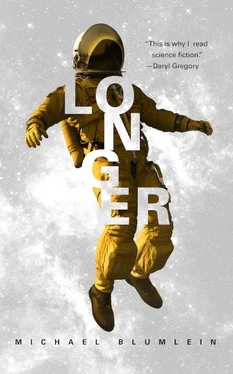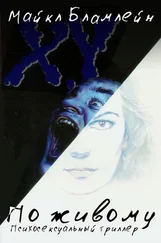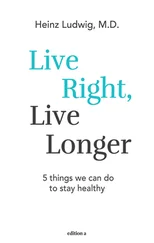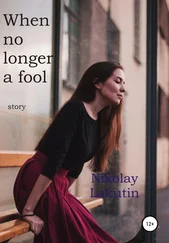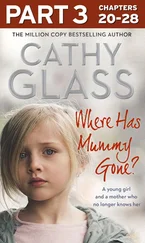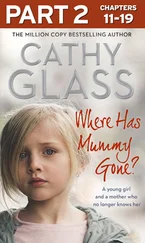“So what does this mean? You’re lending them?”
“Sharing,” said Cantrell. “Passing them along.”
“For a price.”
“Cost plus expenses.”
“No profit?”
“Lots of profit. Just not monetary.”
Dashaud was pleasantly surprised. “That’s very generous of you.”
“I have what I need. As long as I can keep inventing things. Making them, then making them better. Doing my part. Giving progress a nudge. Step by step. Circuit by circuit. Forward, out of the dark ages, into the new age.”
“What’s the new age?”
“Science, Doctor. Intelligence. Rational thinking. Our age. Yours and mine.”
Dashaud raised his glass. “To intelligence.”
“So you’re using them for research,” said Cantrell. “I won’t ask what, but I’m curious. Does Dr. Gharia happen to be involved?”
“Gunjita Gharia?” He kept his voice level.
“That’s the one. Your old boss.”
“I haven’t spoken to her in nearly a century.”
“Really? A whole century?”
“Half a century. Fifty years at least.”
“You worked in her lab.”
“Briefly.”
“You left.”
“People do. It’s expected. This was all very long ago.” He was ready to move on.
But Cantrell had his teeth in it. “What was she like?”
“I barely remember. Smart. Successful.”
“Like you.”
“It was that kind of lab. Competitive. Highly prized. People killed to get into it.”
“Was it hard? Working side by side with her? Elbow to elbow. Two superstars, sharing the spotlight.”
“I was her student. Hardly a superstar. She mentored me.”
Cantrell nodded. His attention seemed to wander.
“I worked in a lab once,” he said. “I had a mentor, too. He stole my ideas. When I complained, he got rid of me.”
“I’m sorry to hear that.”
“I got blacklisted.”
“How awful.”
“Is that what happened to you?”
“Not at all.”
Cantrell gave him a sly, conspiratorial look, as though he recognized a kindred spirit, a comrade in arms. “She got rid of you, didn’t she?”
Dashaud was speechless.
“We’re not so different,” Cantrell added.
Dashaud felt otherwise, as though a gauntlet had been tossed. “I got an offer from another lab. A very generous offer. She told me to take it. She was doing her job.”
“Told you, or asked you? Forced you maybe?”
“She guided me. That’s what mentors do.”
“I was told, too. I wasn’t asked. I wasn’t thanked. I was coerced.”
For Dashaud, an old wound, long since healed. He’d hated her for a time, but for a much longer time had understood the wisdom in what she had done, and admired her for it.
He would not stand idly by while her reputation was dragged through the mud.
“She gave me an option.”
“The HUBIE lab?”
“Wasn’t called that then. But yes. There was a core group. It was a good move.”
“Good? Career, Dashaud. Career. May I call you Dashaud?”
“It was a long time ago.”
“Best thing that could have happened. Trust me on this.”
“Look. Abel. May I call you Abel?”
“My friends call me Spud.”
“Spud then.”
“Like the potato. I built a satellite when I was a kid. A little one, with a tiny hollow space inside. Named it Sputnik, in honor of … well, you know what. Later on, I changed the name, in honor of its first payload. Know what it was?”
“A potato chip.”
“How’d you guess?”
“Listen, Spud. Just to be perfectly clear. I’ve got no ax to grind. No grievance. Dr. Gharia’s the best there is. She’s in a class by herself. I’ve got nothing but respect for her.”
Cantrell looked like the cat who swallowed the canary. “Your secret’s safe with me.”
“What secret? There is no secret.”
Cantrell made the motion of zipping his lips.
Dashaud felt the blood rise. He had an urge to rearrange the man’s face. This came as a surprise to him, as the days of uncontrolled impulses and outbursts were behind him. Far behind, or so he thought.
Cantrell was not a small man, but Dashaud Mikelson towered over him, and was half again as broad. His fists were like hams. His chest and biceps strained against the seams of his shirt.
He eyed the man, considering his options. Age and experience had taught him the value of restraint. Now he was young, with a young man’s sense of indignation and urgency, and a young man’s refusal to be straitjacketed.
He raised his hands, feeling mighty and righteous, intent on wringing the man’s neck.
Cantrell froze, then went for his gun. Quick, but not quick enough. Dashaud got to him first.
It was over in a second.
“Hey!” Cantrell yelped. “You’re crushing me.”
It was true. Dashaud had him pinned in a fierce, manly, beefcake embrace.
“Let me go!”
Dashaud released him. “So how did it taste?”
Cantrell gave him a wary look. “How did what taste?”
“The chip. When it got back.”
Puzzlement. Suspicion.
Dashaud grinned. “Crisp?”
“Is this a joke?”
“Salty?”
“You’re messin’ with me.”
“Cosmic?”
Cantrell’s wariness deepened. All at once he broke into a grin. Then a laugh. Here was the brother he’d never had. Fate, or foresight, had brought them together. The HUBIES, whom he’d faithfully nursed, were theirs together. He and Dashaud were their custodians. Their guardians. He and Dashaud: inextricably bound.
“Out of this world,” he said.
…I may have seemed somewhat strange
caring in my own time for living things
with no value that we know… [1] From The Blind Seer of Ambon, by W. S. Merwin.
Human beings were not meant to float, so naturally everyone wanted to, Cav included. You could do it on Earth with injectable micropackets of supercharged helium. He’d tried these on a couple of occasions. What he got was a roller coaster ride. One moment up (as it were), then up higher, then flat on his back. He preferred something smoother and more predictable.
He’d dreamed about a voyage into space since boyhood. It was relatively easy to book a trip, which was not to say cheap. Somehow he’d never gotten around to it. Now here he was, living the dream, but late in the game, on the downslope of life, well past his prime. A missed opportunity, and a reason for regret.
But there was no regret, and in fact, he felt the opposite. This was his opportunity, and it couldn’t have come at a better time.
He hurt. Knees, feet, back, neck … the joints ground down by a lifetime of gravity. Joint replacement, once popular, now superseded by juvenation, was obsolete, a footnote in history. His pain was not terrible, but it was frequent. Occasionally, it would sharpen, and he would gasp, or freeze.
He was hardly alone in this. Soreness, achiness, little stabs and embarrassments were universal in his age group. A fact of life.
But not in space. Being weightless robbed gravity of its teeth. Bone no longer gnashed against bone. Nerves were no longer pinched. Pain went from a roar, or a dull roar, to a whisper, and often to silence. A truly liberating experience.
Liberation came at a price, however, as other age-related problems, previously overshadowed, were now freed to make their presence known. Eyes, bladder, balance, concentration. His wonky heart. Amazing all the ways a body could fall apart. Equally, or more amazing, all the ways it didn’t, how well it worked, and for how long.
He loved being weightless; floating not so much. It was counterintuitive, and made him uneasy, as though his body knew it wasn’t right. He’d stuck a tall stool in front of the Ooi for this reason, anchoring it to the floor. Nothing he liked better than to sit on it, strap himself down, and let his mind drift.
Читать дальше
